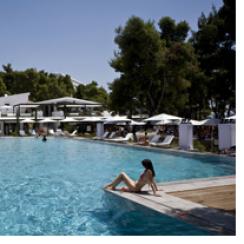Not content to sit back while other global luxury tourism operators cash in on growing demand from China’s increasingly wealthy middle class, a Shanghai company has snapped up a piece of Club Méditerranée, the Paris-based high-end resorts operator.
“Wealthy Chinese love Europe and European luxury brands,” says Sunny Fan, a Beijing-based marketing consultant. “As China grows, Chinese acquisition appetite for luxury goods and even companies will grow.”

“We expect this to be the start of a long-lasting trend, with powerful synergies between Chinese groups looking for a global reach and deploying capital and global firms with strong brands or technology looking for capital,” says André Loesekrug-Pietri, founder and managing partner of Hong Kong–based A Capital Asia, which advised Fosun Group when it paid €23.38 million ($28.14 million) for a 7.1 percent stake in Club Med in June. “This deal is the first-ever minority investment by a Chinese group into a global brand in order to strongly support its China strategy.”
Founded in 1992 by four graduates of Shanghai’s Fudan University, Fosun specializes in taking strategic stakes in private and publicly listed Chinese companies in sectors including media, pharmaceuticals, property development, steel, mining and retail distribution.
Next stop: tourism. The Club Med investment indicates Fosun isn’t restricting itself to Chinese companies. A hint may have been its move in February to lure former U.S. Treasury secretary John Snow onto its board as an adviser. Fosun also established a joint venture with private equity giant Carlyle Group, with an eye to investing $100 million in fast-growing Chinese companies, predominantly in the technology sector, but also in the growing niche of environmental technology.
Club Med, which operates 80 resorts around the world, is due to open its first China operation later this year — a ski resort called Club Med Yabuli in northeast China, near the Russian border. Fosun will help Club Med market its European resorts to Chinese vacationers by leveraging its stakes in some major Chinese media companies, including Sina.com.
China’s tourism market is exploding. Total domestic travel topped 1 trillion yuan ($146 billion) for the first time in 2009, with a record 1.9 billion trips. According to the China Tourism Academy in Beijing, there were about 49 million overseas trips in 2009, and that’s expected to climb to 54 million this year. The United Nations World Tourism Organization predicts China will be the world’s fourth-largest source of outbound tourists by 2020, with 100 million overseas visits.
Still, it doesn’t mean there aren’t political challenges as China’s top firms seek to expand by acquisition into global markets. When they tried taking larger stakes in Wall Street firms and Australian mining companies during the past two years, for example, Chinese investors were rebuffed. “Fosun realizes there are many cultural and political challenges, and that it’s better to seek just a small stake at the beginning,” says Loesekrug-Pietri. The firm will limit its stake to no more than 10 percent for the coming 24 months.






